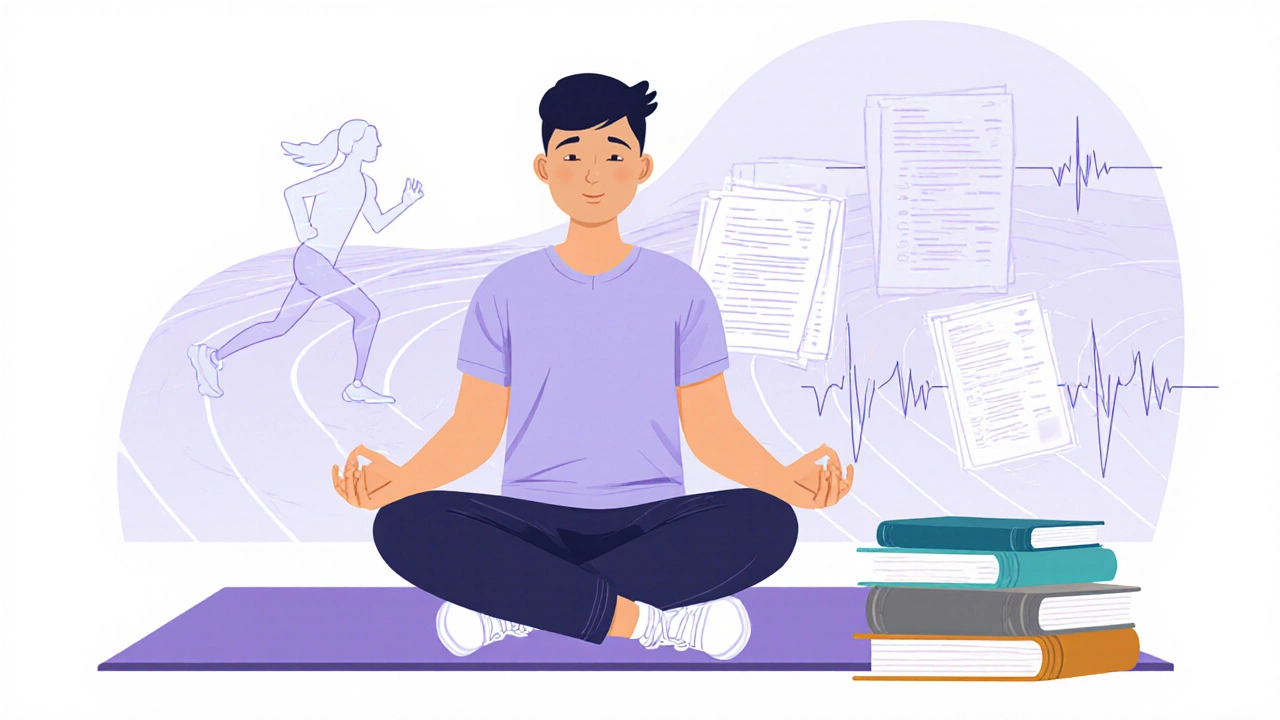Exam Mindset Assessment
Assess Your Competitive Exam Mindset
This assessment will help you understand your psychological drivers for exam performance. Answer the following questions based on your typical behavior and mindset.
Ever wonder why a handful of students seem to light up at the thought of a tough test while others dread the same challenge? The answer lies in the psychology of competitiveness. By unpacking the mental drivers behind competitive people, you can see what fuels their drive, how they manage pressure, and what you can borrow from their mindset to boost your own exam game.
Understanding Competitiveness as a Trait
Competitiveness is a personality trait characterized by a persistent desire to outperform others and achieve superior results. It isn’t just about winning; it’s a blend of ambition, persistent effort, and a willingness to face challenges head‑on. Researchers link high competitiveness to the dopamine system, which rewards goal‑directed behavior. In the context of competitive exams, this trait translates into longer study hours, strategic preparation, and a resilient attitude toward setbacks.
Why Some Students Thrive in Competitive Exams
Students who consistently rank at the top often share a common psychological profile. They exhibit strong Achievement motivation that pushes them to set lofty goals and measure success through measurable outcomes. Their Goal orientation leans toward mastery - they focus on learning the material deeply rather than merely outperforming peers. This blend of internal drive and strategic focus creates a feedback loop: effort leads to progress, which fuels further effort.
Core Psychological Drivers
- Intrinsic motivation is the inner desire to engage in a task for its own sake, such as the satisfaction of mastering a complex concept. It sustains long‑term study without relying on external rewards.
- Extrinsic motivation involves external incentives like scholarships, high scores, or parental approval. While effective for short bursts, it can wane if the reward disappears.
- Self‑efficacy refers to an individual's belief in their capability to execute tasks successfully. High self‑efficacy predicts persistence during difficult study sessions.
- Growth mindset is the belief that abilities can be developed through effort and learning, as opposed to a fixed mindset that sees talent as static. This mindset reduces fear of failure and encourages risk‑taking in learning.
The Role of Social Comparison
According to Social comparison theory, people evaluate their own abilities by comparing themselves to others. In a classroom setting, seeing a peer ace a mock test can either spur a student to study harder (upward comparison) or demotivate them if the gap feels insurmountable. Competitive individuals tend to use upward comparison constructively, turning others' success into a benchmark rather than a threat.
Managing Stress and Maintaining Balance
High competitiveness can backfire if it fuels chronic stress. Effective stress management strategies include:
- Scheduled breaks: Pomodoro cycles (25 minutes study, 5 minutes rest) keep cortisol levels in check.
- Physical activity: Regular cardio improves brain‑derived neurotrophic factor (BDNF), which aids memory consolidation.
- Mindfulness: A 10‑minute daily meditation session reduces anxiety and sharpens focus.

Practical Tips for Harnessing Competitive Drive
Want to adopt the mental edge of top performers? Try these actionable steps:
- Set process‑oriented goals. Instead of "score 90% on the exam," aim for "complete three practice tests per week." This shifts focus to actions you can control.
- Track progress publicly. Share study milestones with a study group or on a personal blog. Public accountability taps into social comparison in a positive way.
- Use reward mini‑systems. Pair short study bursts with small treats (a favorite snack, a 5‑minute game). This blends extrinsic incentives with intrinsic task enjoyment.
- Reflect on failures. After a mock test, write down three things that went wrong and three concrete improvements. This transforms setbacks into learning opportunities, reinforcing a growth mindset.
- Visualize success. Spend a minute each day picturing yourself confidently tackling exam questions. Visualization primes neural pathways for actual performance.
Quick Reference Table
| Factor | Definition | Typical Behavior | Effect on Exams |
|---|---|---|---|
| Competitiveness | Desire to outperform others | Extended study hours, strategic planning | Higher scores, better time management |
| Achievement Motivation | Drive to attain success | Goal‑setting, persistent effort | Consistent improvement across attempts |
| Growth Mindset | Belief abilities can develop | Seeking challenges, learning from errors | Reduced test anxiety, adaptive learning |
| Self‑Efficacy | Confidence in one’s capabilities | Taking on difficult problems, active rehearsal | Higher persistence during tough sections |
| Social Comparison | Evaluating self via peers | Using peers as benchmarks | Motivation boost when used constructively |
Frequently Asked Questions
Can competitiveness be developed, or is it fixed?
Research shows that while some baseline propensity exists, most of the competitive drive can be nurtured through goal‑setting, feedback, and incremental successes. Coaching and structured practice are key.
How does a growth mindset differ from a fixed mindset in exam prep?
A growth mindset views challenges as opportunities to improve, leading students to engage with difficult topics and persist after mistakes. A fixed mindset sees ability as static, causing avoidance of hard questions and higher anxiety.
Is social comparison always beneficial?
Not always. Constructive upward comparison can motivate, but downward or hostile comparison may trigger envy and burnout. The key is to frame peers’ success as a realistic benchmark, not a threat.
What role does self‑efficacy play during a timed exam?
High self‑efficacy helps students stay calm under pressure, allocate time wisely, and attempt challenging questions rather than skipping them. Confidence reduces the mental load of time anxiety.
Can I balance competitiveness with well‑being?
Yes. By scheduling regular breaks, maintaining physical activity, and practicing mindfulness, competitive students can keep stress in check while still leveraging their drive for high performance.


